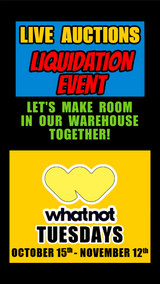How to Sell at a Flea Market: PART 1 - Picking a Good Flea Market
Today we are embarking on a multiple part series about selling at Flea Markets based on our own experience.
I know, your very first question is “Do you still sell at flea markets?”
Answer: No.
Your second question, “Why?”
Answer: "There are two answers. First, our flea market space was so successful that we ended up taking over 4 spaces. Rent was fairly high. The owner of the flea market passed away. His son inherited it. This son immediately raised rent, which made our spaces cost way more than renting a larger, nicer, commercial space would cost. There’s additional reasons that we will discuss within this series, but I think you get the jest."
Your last question, “Is selling at a Flea Market good?”
Answer: "ABSOLUTELY!!! That’s why we are creating this series!"

PART 1: CHOOSING THE RIGHT FLEA MARKET
If you are lucky enough to have multiple flea markets within 1 hour drive time, then awesome!! You can really utilize this information. If you only have 1 flea market, this article will help you decide if it’s a good fit for you.
Unlike an “actual store”, flea markets are usually weekends-only. The absolute most important thing you want to do is visit the flea market on a Friday and Sunday. What you want to look for:
- Saturday is always the busiest day, so if Friday and Sunday are kinda-busy, you’re Saturday is going to be your cash cow. However if Friday and Sunday are dead slow, you are going to be relying on Saturday to make all of your money. I would suggest also going on a Saturday to make sure this is a place that has 1 slammed day per week.
- All businesses have “peak hours”. You can Google Search the name of the flea market and you should see a graph that shows their busiest times each day. Make sure you are visiting the place during Peak Hours because if you visit right when it opens, it’s going to be a ghost town… most businesses are fairly empty right at open and if you decide the place sucks because it’s slow at Open, that was a flawed decision.
- TALK to sellers. Almost all Flea Market sellers are chatty. Ask them “How long have you had your space here?”. Take notes in your phone if needed. If the average seller is brand new and just started that very weekend, that means the flea market has a “high turnover rate”, which means most people don’t stick around. If barely anybody can find success there, it’s quite likely you won’t either. On the other hand, if every 3rd seller you talk to has been around for 6+ months, or even multiple years, that’s a GREAT sign!
- Look for businesses that sell the types of items you plan to sell. Look at what they sell and their prices. If similar-item sellers are selling their merchandise for unrealistically low prices, will this work for you?
- Walk through the flea market and count how many businesses are similar to yours. Similar businesses are GREAT! The identical business can be bad. Think of it like a mall. Inside of a mall there are tons of clothing stores. This means when people want clothing, they drive to the mall. BUT inside each mall there is only 1 Macys. It doesn’t make sense to have two or three Macys stores, all selling the same items. When we had our flea market space we were the only seller of authentic designer womens clothing and we did really well.
- During peak hours, is the entire parking lot full? Make notes of which DOORS people park at the most. These will usually be the most popular doors during slow hours too. Keep in mind that most flea markets will have a specific area for market sellers to park, so don’t be fooled by an area at the back of the Flea Market that is full of cars.
- Stop by the front office and grab a brochure / flyer with rates in addition to any other information you can gather.
- Ask the front desk where employees and sellers park to make sure you can accurately judge the CUSTOMER traffic levels.
- While you are at the front office, ask if there are spaces available. If the office says “No”, then it might not be worth investing a ton of time into deciding if you want a space. Some flea markets will have a waiting list.
- Read reviews about the Flea Market in general. What do people like? What do they hate? Is the overall feedback positive or negative?
After you do these 10 things you should be able to decide which flea market is right for you. If you have determine that the flea market you are looking at isn't a good fit there are other options that you can consider including festivals, short-term commercial space leases or even having a yard sale.
COMING TOMORROW: PART 2 - How to Pick the Best SPOT at a Flea Market
Recent Posts
-
WhatNot LIVE AUCTIONS LIQUIDATION EVENT! October 15th - Nov 12th!
We are doing a MASSIVE liquidation auction event on WhatNot! Every TUESDAY from October 15th thr …2nd Oct 2024 -
MASSIVE NEWS! 4 HUGE UPDATES Coming to Big Brand Wholesale.com!
We have TONS of exciting news! Check out our Facebook video from July 12th 2024 (below) then keep r …22nd Jul 2024 -
3 COMPANIES PRETENDING TO BE BigBrandWholesale.com! DO NOT ORDER THROUGH IMPOSTERS!
IMPOSTERS! BE CAREFUL!! DON’T BE FOOLED! We now have at least 3 different people PRETENDING to …23rd Dec 2023




